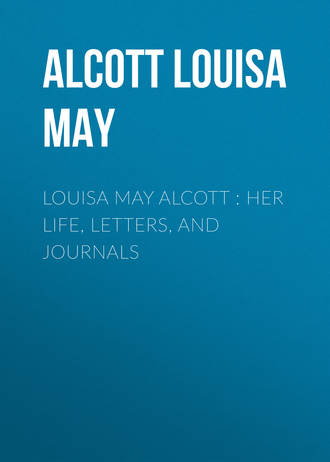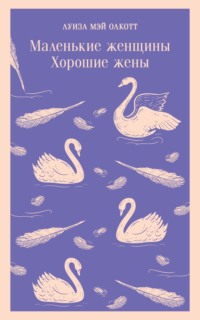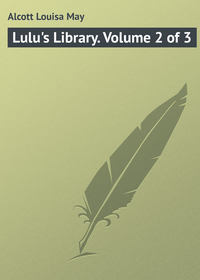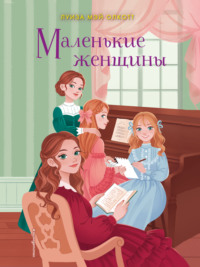 полная версия
полная версияLouisa May Alcott : Her Life, Letters, and Journals
The writing went on, and she received five, six, or ten dollars apiece for her stories; but she did not yet venture to give up the sewing and teaching, which was still the sure reliance.
Her younger sister now began to exercise her talent, and illustrated a little book of Louisa's called "Christmas Elves," which she says is better than "Flower Fables."
JournalRead Charlotte Bronté's life. A very interesting, but sad one. So full of talent; and after working long, just as success, love, and happiness come, she dies.
Wonder if I shall ever be famous enough for people to care to read my story and struggles. I can't be a C. B., but I may do a little something yet.
July.– Grandma Alcott came to visit us. A sweet old lady; and I am glad to know her, and see where Father got his nature. Eighty-four; yet very smart, industrious, and wise. A house needs a grandma in it.
As we sat talking over Father's boyhood, I never realized so plainly before how much he has done for himself. His early life sounded like a pretty old romance, and Mother added the love passages.
I got a hint for a story; and some day will do it, and call it "The Cost of an Idea." Spindle Hill, Temple School, Fruitlands, Boston, and Concord, would make fine chapters. The trials and triumphs of the Pathetic Family would make a capital book; may I live to do it.
August.– A sad, anxious month. Betty worse; Mother takes her to the seashore. Father decides to go back to Concord; he is never happy far from Emerson, the one true friend who loves and understands and helps him.
September.– An old house near R. W. E.'s is bought with Mother's money, and we propose to move. Mother in Boston with poor Betty, who is failing fast. Anna and I have a hard time breaking up.
October.– Move to Concord. Take half a house in town till spring, when the old one is to be made ready.
Find dear Betty a shadow, but sweet and patient always. Fit up a nice room for her, and hope home and love and care may keep her.
People kind and friendly, and the old place looks pleasant, though I never want to live in it.
November.– Father goes West, taking Grandma home. We settle down to our winter, whatever it is to be. Lizzie seems better, and we have some plays. Sanborn's school makes things lively, and we act a good deal.
Twenty-five this month. I feel my quarter of a century rather heavy on my shoulders just now. I lead two lives. One seems gay with plays, etc., the other very sad,–in Betty's room; for though she wishes us to act, and loves to see us get ready, the shadow is there, and Mother and I see it. Betty loves to have me with her; and I am with her at night, for Mother needs rest. Betty says she feels "strong" when I am near. So glad to be of use.
December.– Some fine plays for charity.
January, 1858.– Lizzie much worse; Dr. G. says there is no hope. A hard thing to hear; but if she is only to suffer, I pray she may go soon. She was glad to know she was to "get well," as she called it, and we tried to bear it bravely for her sake. We gave up plays; Father came home; and Anna took the housekeeping, so that Mother and I could devote ourselves to her. Sad, quiet days in her room, and strange nights keeping up the fire and watching the dear little shadow try to wile away the long sleepless hours without troubling me. She sews, reads, sings softly, and lies looking at the fire,–so sweet and patient and so worn, my heart is broken to see the change. I wrote some lines one night on "Our Angel in the House."
[Jo and Beth.–L. M. A.]
February.– A mild month; Betty very comfortable, and we hope a little.
Dear Betty is slipping away, and every hour is too precious to waste, so I'll keep my lamentations over Nan's [affairs] till this duty is over.
Lizzie makes little things, and drops them out of windows to the school-children, smiling to see their surprise. In the night she tells me to be Mrs. Gamp, when I give her her lunch, and tries to be gay that I may keep up. Dear little saint! I shall be better all my life for these sad hours with you.
March 14th.– My dear Beth died at three this morning, after two years of patient pain. Last week she put her work away, saying the needle was "too heavy," and having given us her few possessions, made ready for the parting in her own simple, quiet way. For two days she suffered much, begging for ether, though its effect was gone. Tuesday she lay in Father's arms, and called us round her, smiling contentedly as she said, "All here!" I think she bid us good-by then, as she held our hands and kissed us tenderly. Saturday she slept, and at midnight became unconscious, quietly breathing her life away till three; then, with one last look of the beautiful eyes, she was gone.
A curious thing happened, and I will tell it here, for Dr. G. said it was a fact. A few moments after the last breath came, as Mother and I sat silently watching the shadow fall on the dear little face, I saw a light mist rise from the body, and float up and vanish in the air. Mother's eyes followed mine, and when I said, "What did you see?" she described the same light mist. Dr. G. said it was the life departing visibly.
For the last time we dressed her in her usual cap and gown, and laid her on her bed,–at rest at last. What she had suffered was seen in the face; for at twenty-three she looked like a woman of forty, so worn was she, and all her pretty hair gone.
On Monday Dr. Huntington read the Chapel service, and we sang her favorite hymn. Mr. Emerson, Henry Thoreau, Sanborn, and John Pratt, carried her out of the old home to the new one at Sleepy Hollow chosen by herself. So the first break comes, and I know what death means,–a liberator for her, a teacher for us.
April.– Came to occupy one wing of Hawthorne's house (once ours) while the new one was being repaired. Father, Mother, and I kept house together; May being in Boston, Anna at Pratt Farm, and, for the first time, Lizzie absent. I don't miss her as I expected to do, for she seems nearer and dearer than before; and I am glad to know she is safe from pain and age in some world where her innocent soul must be happy.
Death never seemed terrible to me, and now is beautiful; so I cannot fear it, but find it friendly and wonderful.
May.– A lonely month with all the girls gone, and Father and Mother absorbed in the old house, which I don't care about, not liking Concord.
On the 7th of April, Anna came walking in to tell us she was engaged to John Pratt; so another sister is gone. J. is a model son and brother,–a true man,–full of fine possibilities, but so modest one does not see it at once. He is handsome, healthy, and happy; just home from the West, and so full of love he is pleasant to look at.
I moaned in private over my great loss, and said I'd never forgive J. for taking Anna from me; but I shall if he makes her happy, and turn to little May for my comfort.
[Now that John is dead, I can truly say we all had cause to bless the day he came into the family; for we gained a son and brother, and Anna the best husband ever known.
For ten years he made her home a little heaven of love and peace; and when he died he left her the legacy of a beautiful life, and an honest name to his little sons.–L. M. A., 1873.]
June.– The girls came home, and I went to visit L. W. in Boston. Saw Charlotte Cushman, and had a stage-struck fit. Dr. W. asked Barry to let me act at his theatre, and he agreed. I was to do Widow Pottle, as the dress was a good disguise and I knew the part well. It was all a secret, and I had hopes of trying a new life; the old one being so changed now, I felt as if I must find interest in something absorbing. But Mr. B. broke his leg, so I had to give it up; and when it was known, the dear, respectable relations were horrified at the idea. I'll try again by-and-by, and see if I have the gift. Perhaps it is acting, not writing, I'm meant for. Nature must have a vent somehow.
July.– Went into the new house and began to settle. Father is happy; Mother glad to be at rest; Anna is in bliss with her gentle John; and May busy over her pictures. I have plans simmering, but must sweep and dust and wash my dish-pans a while longer till I see my way.
Worked off my stage fever in writing a story, and felt better; also a moral tale, and got twenty-five dollars, which pieced up our summer gowns and bonnets all round. The inside of my head can at least cover the outside.
August.– Much company to see the new house. All seem to be glad that the wandering family is anchored at last. We won't move again for twenty years if I can help it. The old people need an abiding place; and now that death and love have taken two of us away, I can, I hope, soon manage to care for the remaining four.
The weeklies will all take stories; and I can simmer novels while I do my housework, so see my way to a little money, and perhaps more by-and-by if I ever make a hit.
Probably owing to the excitement of grief for her sister's death, and sympathy in Anna's happy betrothal, Louisa became in October more discouraged than she had ever been, and went to Boston in search of work. As she walked over the mill dam the running stream brought the thought of the River of Death, which would end all troubles. It was but a momentary impulse, and the brave young heart rallied to the thought, "There is work for me, and I'll have it!" Her journal narrates how Mr. Parker helped her through this period of anxiety. She was all ready to go to Lancaster, to hard drudgery at sewing, when her old place as governess was again offered to her, and her own support was assured.
October.– Went to Boston on my usual hunt for employment, as I am not needed at home and seem to be the only bread-winner just now.
My fit of despair was soon over, for it seemed so cowardly to run away before the battle was over I couldn't do it. So I said firmly, "There is work for me, and I'll have it," and went home resolved to take Fate by the throat and shake a living out of her.
Sunday Mr. Parker preached a sermon on "Laborious Young Women." Just what I needed; for it said: "Trust your fellow-beings, and let them help you. Don't be too proud to ask, and accept the humblest work till you can find the task you want."
"I will," said I, and went to Mr. P.'s. He was out; but I told Mrs. P. my wants, and she kindly said Theodore and Hannah would be sure to have something for me. As I went home I met Mrs. L., who had not wanted me, as Alice went to school. She asked if I was engaged, and said A. did not do well, and she thought perhaps they would like me back. I was rejoiced, and went home feeling that the tide had begun to turn. Next day came Miss H. S. to offer me a place at the Girls' Reform School at Lancaster, to sew ten hours a day, make and mend. I said I'd go, as I could do anything with a needle; but added, if Mrs. L. wants me I'd rather do that.
"Of course you had. Take it if it comes, and if not, try my work." I promised and waited. That eve, when my bag was packed and all was ready for Lancaster, came a note from Mrs. L. offering the old salary and the old place. I sang for joy, and next day early posted off to Miss S. She was glad and shook hands, saying, "It was a test, my dear, and you stood it. When I told Mr. P. that you would go, he said, 'That is a true girl; Louisa will succeed.'"
I was very proud and happy; for these things are tests of character as well as courage, and I covet the respect of such true people as Mr. P. and Miss S.
So away to my little girl with a bright heart! for with tales, and sewing for Mary, which pays my board, there I am fixed for the winter and my cares over. Thank the Lord!
She now found publishers eager for her stories, and went on writing for them. She was encouraged by E. P. Whipple's praise of "Mark Field's Mistake," and by earning thirty dollars, most of which she sent home.
JournalEarned thirty dollars; sent twenty home. Heard Curtis, Parker, Higginson, and Mrs. Dall lecture. See Booth's Hamlet, and my ideal done at last.
My twenty-sixth birthday on the 29th. Some sweet letters from home, and a ring of A.'s and J.'s hair as a peace-offering. A quiet day, with many thoughts and memories.
The past year has brought us the first death and betrothal,–two events that change my life. I can see that these experiences have taken a deep hold, and changed or developed me. Lizzie helps me spiritually, and a little success makes me more self-reliant. Now that Mother is too tired to be wearied with my moods, I have to manage them alone, and am learning that work of head and hand is my salvation when disappointment or weariness burden and darken my soul.
In my sorrow I think I instinctively came nearer to God, and found comfort in the knowledge that he was sure to help when nothing else could.
A great grief has taught me more than any minister, and when feeling most alone I find refuge in the Almighty Friend. If this is experiencing religion I have done it; but I think it is only the lesson one must learn as it comes, and I am glad to know it.
After my fit of despair I seem to be braver and more cheerful, and grub away with a good heart. Hope it will last, for I need all the courage and comfort I can get.
I feel as if I could write better now,–more truly of things I have felt and therefore know. I hope I shall yet do my great book, for that seems to be my work, and I am growing up to it. I even think of trying the "Atlantic." There 's ambition for you! I'm sure some of the stories are very flat. If Mr. L. takes the one Father carried to him, I shall think I can do something.
December.– Father started on his tour West full of hope. Dear man! How happy he will be if people will only listen to and pay for his wisdom.
May came to B. and stayed with me while she took drawing lessons. Christmas at home. Write an Indian story.
January, 1859.–Send a parcel home to Marmee and Nan.
Mother very ill. Home to nurse her for a week. Wonder if I ought not to be a nurse, as I seem to have a gift for it. Lizzie, L. W., and Mother all say so; and I like it. If I couldn't write or act I'd try it. May yet. $21 from L.; $15 home.
Some day I'll do my best, and get well paid for it.
[$3,000 for a short serial in 1876. True prophet.–L. M. A.]
Wrote a sequel to "Mark Field." Had a queer time over it, getting up at night to write it, being too full to sleep.
March.– "Mark" was a success, and much praised. So I found the divine afflatus did descend. Busy life teaching, writing, sewing, getting all I can from lectures, books, and good people. Life is my college. May I graduate well, and earn some honors!
April.– May went home after a happy winter at the School of Design, where she did finely, and was pronounced full of promise. Mr. T. said good things of her, and we were very proud. No doubt now what she is to be, if we can only keep her along.
I went home also, being done with A., who went out of town early. Won't teach any more if I can help it; don't like it; and if I can get writing enough can do much better.
I have done more than I hoped. Supported myself, helped May, and sent something home. Not borrowed a penny, and had only five dollars given me. So my third campaign ends well.
May.– Took care of L. W., who was ill. Walked from C. to B. one day, twenty miles, in five hours, and went to a party in the evening. Not very tired. Well done for a vegetable production!
June.– Took two children to board and teach. A busy month, as Anna was in B.
September.– Great State Encampment here. Town full of soldiers, with military fuss and feathers. I like a camp, and long for a war, to see how it all seems. I can't fight, but I can nurse.
[Prophetic again.–L. M. A.]
October, 1859.–May did a fine copy of Emerson's Endymion7 for me.
Mother sixty. God bless the dear, brave woman!
Good news of Parker in Florence,–my beloved minister and friend. To him and R. W. E. I owe much of my education. May I be a worthy pupil of such men!
November.– Hurrah! My story was accepted; and Lowell asked if it was not a translation from the German, it was so unlike most tales. I felt much set up, and my fifty dollars will be very happy money. People seem to think it a great thing to get into the "Atlantic;" but I've not been pegging away all these years in vain, and may yet have books and publishers and a fortune of my own. Success has gone to my head, and I wander a little. Twenty-seven years old, and very happy.
The Harper's Ferry tragedy makes this a memorable month. Glad I have lived to see the Antislavery movement and this last heroic act in it. Wish I could do my part in it.
December, 1859.–The execution of Saint John the Just took place on the second. A meeting at the hall, and all Concord was there. Emerson, Thoreau, Father, and Sanborn spoke, and all were full of reverence and admiration for the martyr.
I made some verses on it, and sent them to the "Liberator."
A sickness of Mrs. Alcott through which she nursed her makes Louisa question whether nursing is not her true vocation. She had an opportunity to try it later.
Much interest attaches to this period of Louisa's work, when she dashed off sensational stories as fast as they were wanted, from the account which she has given of it in "Little Women." She has concentrated into one short period there the work and the feelings of a much longer time. She certainly did let her fancy run riot in these tales, and they were as sensational as the penny papers desired. She had a passion for wild, adventurous life, and even for lurid passion and melodramatic action, which she could indulge to the utmost in these stories. Louisa was always a creature of moods; and it was a great relief to work off certain feelings by the safe vent of imaginary persons and scenes in a story. She had no one to guide or criticise her; and the fact that these gambols of fancy brought the much-needed money, and were, as she truly called them, "pot boilers," certainly did not discourage her from indulging in them. She is probably right in calling most of them "trash and rubbish," for she was yet an unformed girl, and had not studied herself or life very deeply; but her own severe condemnation of them in "Little Women" might give a false idea. The stories are never coarse or immoral. They give a lurid, unnatural picture of life, but sin is not made captivating or immorality attractive. There is often a severe moral enforced. They did not give poison to her readers, only over-seasoned unnatural food, which might destroy the relish for wholesome mental nourishment.
We are inclined to ask, What did Louisa herself get out of this wild, Walpurgis-Night ride among ghosts and goblins, letting her fancy run riot, and indulging every mood as it rose? Did it not give her the dash and freedom in writing which we find in all her books, a command of language, and a recognition of the glow and force of life? She finds life no mere commonplace drudgery, but full of great possibilities. Did it not also give her an interest in all the wild fancies and dreams of girls, all the longing for adventure of boys, and make her hopeful even of the veriest young scamps that they would work off the turbulent energies of youth safely if activities were wisely provided for them?
No writer for children ever was so fully recognized as understanding them. They never felt that she stood on a pinnacle of wisdom to censure them, but came right down into their midst to work and play with them, and at the same time to show them the path out of the tangled thickets, and to help them to see light in their gloomiest despair.
Yet she unquestionably recognized that she was not doing the best work of which she was capable; and she looked forward still to the books she was to write, as well as the fortune she was to make. She did not like any reference to these sensational stories in after life, although she sometimes re-used plots or incidents in them; and she was very unwilling to have them republished.
Boston Bulletin,–Ninth IssueSunday Eve, November, 1858.My blessed Nan,–Having finished my story, I can refresh my soul by a scribble to you, though I have nothing to tell of much interest.
Mrs. L. is to pay me my "celery" each month, as she likes to settle all bills in that way; so yesterday she put $20.85 into my willing hands, and gave me Saturday p. m. for a holiday. This unexpected $20, with the $10 for my story (if I get it) and $5 for sewing, will give me the immense sum of $35. I shall get a second-hand carpet for the little parlor, a bonnet for you, and some shoes and stockings for myself, as three times round the Common in cold weather conduces to chilblains, owing to stockings with a profusion of toe, but no heel, and shoes with plenty of heel, but a paucity of toe. The prejudices of society demand that my feet be covered in the houses of the rich and great; so I shall hose and shoe myself, and if any of my fortune is left, will invest it in the Alcott Sinking Fund, the Micawber R. R., and the Skimpole three per cents.
Tell me how much carpet you need, and T. S. will find me a good one. In December I shall have another $20; so let me know what is wanting, and don't live on "five pounds of rice and a couple of quarts of split peas" all winter, I beg.
How did you like "Mark Field's Mistake"? I don't know whether it is good or bad; but it will keep the pot boiling, and I ask no more. I wanted to go and see if "Hope's Treasures" was accepted, but was afeared. M. and H. both appeared; but one fell asleep, and the other forgot to remember; so I still wait like Patience on a hard chair, smiling at an inkstand. Miss K. asked me to go to see Booth for the last time on Saturday. Upon that ravishing thought I brooded all the week very merrily, and I danced, sang, and clashed my cymbals daily. Saturday a. m. Miss K. sent word she couldn't go, and from my pinnacle of joy I was precipitated into an abyss of woe. While in said abyss Mrs. L. put the $20 into my hands. That was a moment of awful trial. Every one of those dollars cried aloud, "What, ho! Come hither, and be happy!" But eight cold feet on a straw carpet marched to and fro so pathetically that I locked up the tempting fiend, and fell to sewing, as a Saturday treat!
But, lo! virtue was rewarded. Mrs. H. came flying in, and took me to the Museum to see "Gold" and "Lend Me Five Shillings." Warren, in an orange tie, red coat, white satin vest, and scarlet ribbons on his ankles, was the funniest creature you ever saw; and I laughed till I cried,–which was better for me than the melancholy Dane, I dare say.
I'm disgusted with this letter; for I always begin trying to be proper and neat; but my pen will not keep in order, and ink has a tendency to splash when used copiously and with rapidity. I have to be so moral and so dignified nowadays that the jocosity of my nature will gush out when it gets a chance, and the consequences are, as you see, rubbish. But you like it; so let's be merry while we may, for to-morrow is Monday, and the weekly grind begins again.
CHAPTER VI
THE YEAR OF GOOD LUCK
THE CHILDREN'S SONGTune.– "Wait for the Wagon."The world lies fair about us, and a friendly sky above;Our lives are full of sunshine, our homes are full of love;Few cares or sorrows sadden the beauty of our day;We gather simple pleasures like daisies by the way.Chorus.– Oh! sing with cheery voices,Like robins on the tree;For little lads and lassesAs blithe of heart should be.The village is our fairyland: its good men are our kings;And wandering through its by-ways our busy minds find wings.The school-room is our garden, and we the flowers there,And kind hands tend and water us that we may blossom fair.Chorus.– Oh! dance in airy circles,Like fairies on the lee;For little lads and lassesAs light of foot should be.There's the Shepherd of the sheepfold; the Father of the vines;The Hermit of blue Walden; the Poet of the pines;And a Friend who comes among us, with counsels wise and mildWith snow upon his forehead, yet at heart a very child.Chorus.– Oh! smile as smiles the river,Slow rippling to the sea;For little lads and lassesAs full of peace should be.There's not a cloud in heaven but drops its silent dew;No violet in the meadow but blesses with its blue;No happy child in Concord who may not do its partTo make the great world better by innocence of heart.Chorus.– Oh! blossom in the sunshineBeneath the village tree;For little lads and lassesAre the fairest flowers we see.AFTER such long and hard struggles, it is pleasant to find the diary for 1860 headed "A Year of Good Luck." The appointment of Mr. Alcott as Superintendent of Schools in Concord was a great happiness to the family. It was a recognition of his character and ability, and gave him congenial occupation and some small pecuniary compensation.









